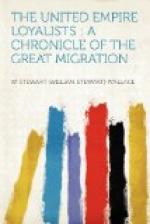CHAPTER III
PERSECUTION OF THE LOYALISTS
In the autumn of the year 1779 an English poet, writing in the seclusion of his garden at Olney, paid his respects to the American revolutionists in the following lines:
Yon roaring boys, who rave and fight
On t’other side the
Atlantic,
I always held them in the right,
But most so when most frantic.
When lawless mobs insult the court,
That man shall be my toast,
If breaking windows be the sport,
Who bravely breaks the most.
But oh! for him my fancy culls
The choicest flowers she bears,
Who constitutionally pulls
Your house about your ears.
When William Cowper wrote these lines, his sources of information with regard to affairs in America were probably slight; but had he been writing at the seat of war he could not have touched off the treatment of the Loyalists by the revolutionists with more effective irony.
There were two kinds of persecution to which the Loyalists were subjected—that which was perpetrated by ’lawless mobs,’ and that which was carried out ‘constitutionally.’
It was at the hands of the mob that the Loyalists first suffered persecution. Probably the worst of the revolutionary mobs was that which paraded the streets of Boston. In 1765, at the time of the Stamp Act agitation, large crowds in Boston attacked and destroyed the magnificent houses of Andrew Oliver and Thomas Hutchinson. They broke down the doors with broadaxes, destroyed the furniture, stole the money and jewels, scattered the books and papers, and, having drunk the wines in the cellar, proceeded to the dismantling of the roof and walls. The owners of the houses barely escaped with their lives. In 1768 the same mob wantonly attacked the British troops in Boston, and so precipitated what American historians used to term ‘the Boston Massacre’; and in 1773 the famous band of ‘Boston Indians’ threw the tea into Boston harbour.
In other places the excesses of the mob were nearly as great. In New York they were active in destroying printing-presses from which had issued Tory pamphlets, in breaking windows of private houses, in stealing live stock and personal effects, and in destroying property. A favourite pastime was tarring and feathering ’obnoxious Tories.’ This consisted in stripping the victim naked, smearing him with a coat of tar and feathers, and parading him about the streets in a cart for the contemplation of his neighbours. Another amusement was making Tories ride the rail. This consisted in putting the ’unhappy victims upon sharp rails with one leg on each side; each rail was carried upon the shoulders of two tall men, with a man on each side to keep the poor wretch straight and fixed in his seat.’




